There is an almighty roar from the back of the auditorium – the sort normally reserved for the sports field and almost never heard in a theatre.
But this is no ordinary evening. It is an audience with the usually reticent Sir Andy Murray and he is being unusually candid in front of an adoring crowd.
We hear about the time he traded in his wife for a Ferrari, how he was accidentally high at the start of a match – and we get the inside scoop on why the curtain came down on his coaching partnership with Novak Djokovic.
This is Andy Murray, Centre Stage, an event touted as ‘a rare opportunity to be in the company of one of the world’s most beloved and entertaining athletes’.
Sir Andy is a bag of nerves as the evening begins, clearly anxious about being under the theatre lights and telling the audience he was terrified no one would show up.
The national treasure needn’t have worried. Not only is the 3,000-seater SEC in Glasgow sold out, he’s in safe hands with a crowd who quite literally cheer him on throughout.
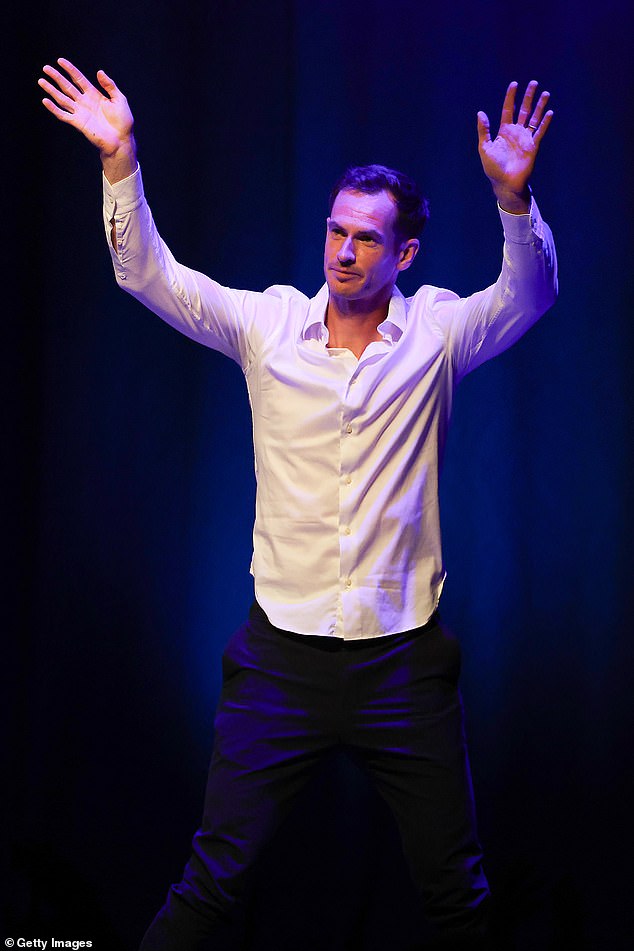
Andy Murray enjoyed his homecoming as he opened up to an adoring audience in Glasgow
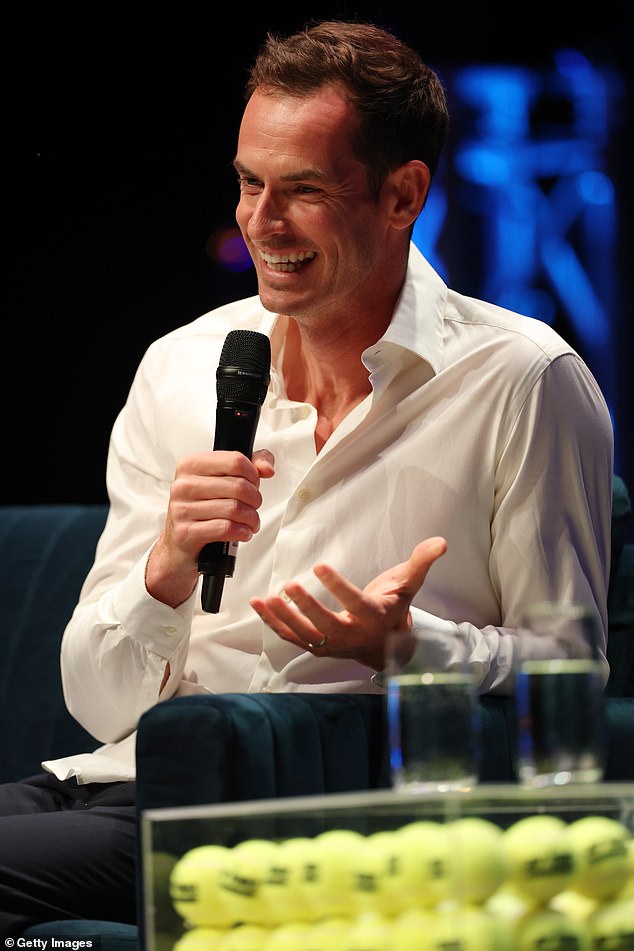
Sir Andy was in fine form as he spoke about his tennis career and, at times, his personal life
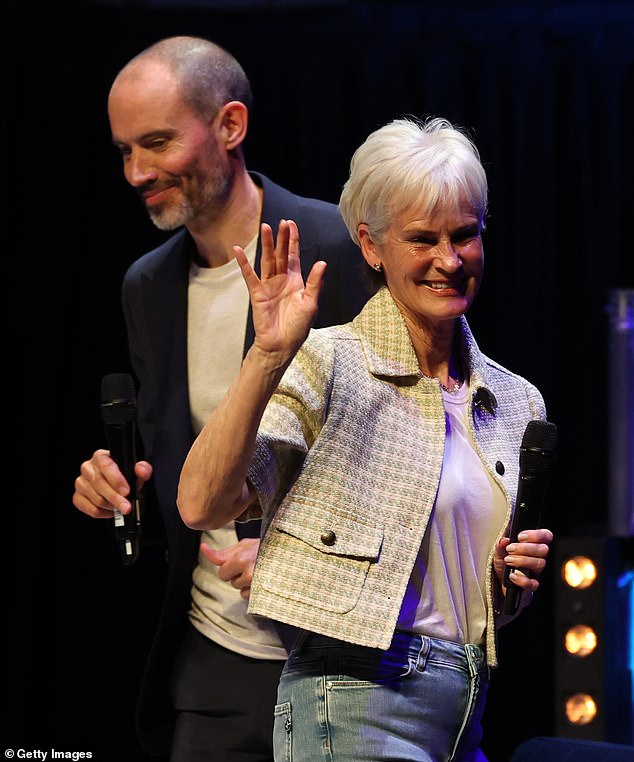
Sir Andy was joined on stage by host Andrew Cotter and his mother, Judy
The opening gambit from host Andrew Cotter – the ‘lesser of the two Andrews’, as he jokes – is a question about Djokovic.
Sir Andy was briefly appointed as coach to the 24-time Grand Slam champion. They worked together through the Australian Open, where the Serb reached the semi-finals before being forced to retire injured. Shortly afterwards, a split was announced.
‘We had a chat on the phone and he asked me if I would consider coaching him, which I wasn’t expecting,’ Murray told the audience.
‘I thought I should give it a go and see whether I enjoyed it.’ There was a pause. ‘I’m not sure if I did.’
Frustratingly, Cotter failed to push for any more information, instead taking Sir Andy on to his love of golf, which he plays four times a week when his children are at school.
In heartwarming revelations about his family life growing up, he spoke of his grandparents’ dogs and said he and his wife Kim have just welcomed a black retriever puppy into their home.
The intimate atmosphere is helped by the audience being banned from whipping out mobile phones, instead having to lock devices away in special pouches.
Sir Andy recalls how, when he was 15, he had the choice of playing for Rangers or trying for a professional tennis career.
With the mere mention of ‘Rangers’ there are roars of approval from sections of the audience and good-natured boos elsewhere, but there is also a strong sense that the crowd are happy tennis was his sport of choice.
At 17 he was faced with another choice – train at the Lawn Tennis Association academy in Sutton or move to Barcelona.
‘I don’t know if many of you have been to Sutton … but I chose to go to the academy in Spain,’ Murray deadpanned.
‘I loved it there. Those are the years where, if I could go back in time, that would be the time I would go back to.’
Throughout the two-hour event, Sir Andy is self-effacing and the very model of understated charm.
His knighthood, he said, is ‘not something I think about’. He never dreamed of great tennis success, he ‘just wanted to be good enough to play at the major events. I never thought I was going to end up winning them’.
Sometimes the public perception of Murray caused him real pain, the interest in his talents beginning when he was 15.
As his success grew, so did media attention. It ‘changed massively, overnight, and it was initially exciting and fun to do press conferences and have people taking pictures of you,’ he said. ‘And it’s nice, but you’re not properly prepared for it.
‘The media in Great Britain can be pretty harsh and the mood changes fast. At first you’re a breath of fresh air, who speaks his mind, to being a moody teenager.
‘People start talking about how you speak, how you look, how you behave, the things you should be doing differently.
‘A lot of the pundits are people you’ve looked up to, people you’ve watched on TV. It’s hard. You take what they’re saying to heart.’

Sir Andy went head to head with three greats of the game: Federer, Nadal and Djokovic
Then came his infamous ‘anyone but England’ response to being asked who he would support at the football World Cup – after being mocked by Tim Henman that Scotland would not be there.
‘A lot of the fan mail would come to your locker [at Wimbledon] at that time and there was a lot of abusive mail.
‘I remember walking to the court for one of my mixed doubles matches and someone was on the phone and just went: “There’s that f***ing Scottish guy”. I was 19 at the time.
‘I was very miserable, and I’m aware of that, but it changed my relationship with the media. I felt unbelievably defensive and very guarded.’
Growing up in the spotlight was hard, even with close family support, and it had a knock-on effect on his relationship when Kim was his girlfriend.
When he was 21, he and Kim split up and, in response, he bought a Ferrari.
‘I thought that was going to be a cool thing to do.
‘When I first took it out on the road I was pulled over by the police. Not because I was driving too quickly but because the insurance hadn’t gone through yet.
‘This was literally within two or three minutes of driving on the road with it.’
Murray got rid of the car after a couple of months, having never driven it again.
His success allowed the public to warm to him, he said, and that warmth is clear in the SEC – the audience gripped by his every word.
Mum Judy Murray joined him on stage to talk about the effects of watching her boy struggle and win, struggle and win.
‘When he won Wimbledon, it was complete and utter relief,’ said Judy.
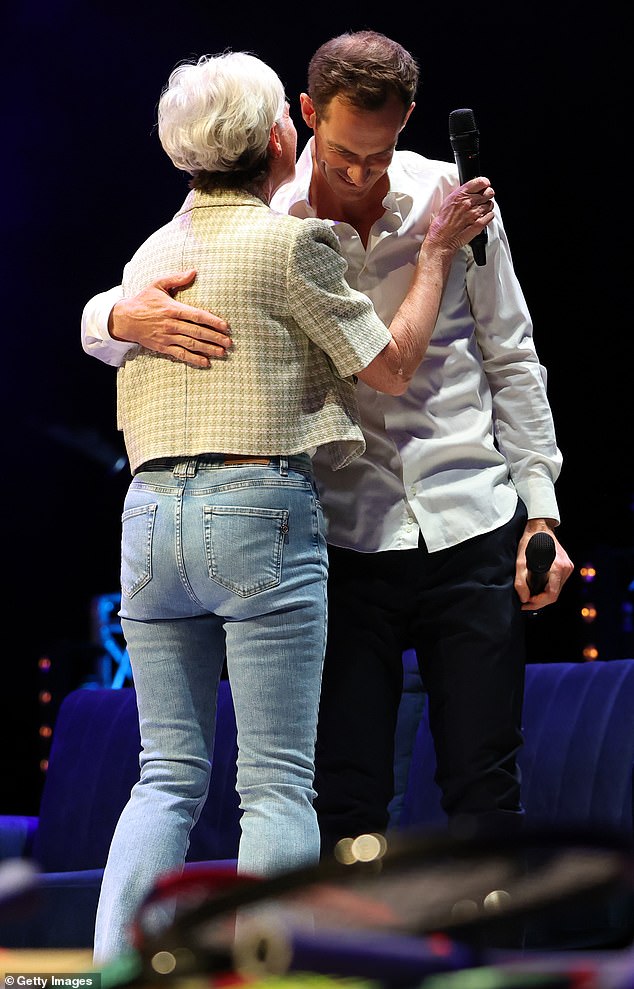
Mum Judy admitted it was ‘a relief’ when her son won his first Wimbledon title in 2013
‘It always helped me through the boys’ journeys that I was a coach, as well as obviously being a parent, because I was always able to look at a match analytically and look for the things that could be improved.
‘So I wasn’t just entirely caught up in the emotion of it, but when I saw how much the loss in 2012 (at Wimbledon) affected Andy and watching him give the speech on court when he lost, they were really, really difficult moments.
‘People forget that everything is relatively easy when you win, but dealing with the defeats and the disappointments is incredibly tough, not just for the player, but for everybody around the player.’
Andy revealed there was a time when he wished the ‘When are you going to win Wimbledon?’ questions would stop. Instead it became ‘Are you going to win again?’ after his 2013 triumph.
Asked if he was bothered about Djokovic, Roger Federder and Rafael Nadal being termed as the Big Three during his era, he was characteristically modest.
‘It’s not something I lose any sleep over at night,’ he said.
‘I’m fully aware that those guys, what they’ve achieved is far greater than anything I’ve done.
‘And I would never claim to be on the same level as them…’
It’s hard to hear the end of his answer as the audience calls out ‘You are, yes you are’.
Sir Andy is candid about the emotional side of the game and brutally honest about his physical trials.
Hip problems started when he was 21 and he went to see a specialist after the Australian Open.
Sir Andy was told that, because of the particular shape of his hips, they might cause him problems later in his career.
He was offered an operation to potentially help with the issues – but it held no guarantees so he turned it down.
It was only in 2016, after the Olympics, when the hip started to become a problem in matches.
At the end of 2016, he lost from two sets to one up in the US Open quarter-finals, and lost from two sets to one up in the Davis Cup against Juan Martin del Potro.
‘At the end of these matches, the long matches, I was really struggling to use my right leg properly,’ he said.
In January 2018, Murray had his first hip operation with the surgeon he had initially seen in Australia.
By this point there was no cartilage left in his hip, just bone rubbing on bone.
Before a match at Wimbledon in 2017, during warm up running drills, Murray was in so much pain he cried. To get him through the match he took a codeine tablet for the first time.
‘I had never had one before,’ he said. ‘And I was totally spaced out at the beginning of that match.
‘Usually I’m quite nervous but I just remember looking around thinking: “What’s going on out here”?’
Cotter joked: ‘Usually as commentators we think we know what’s going on. Now, if I could go back in time, I’d say he was clearly off his t*ts.’
When Murray had revealed that his hip caused him so much pain he would cry at night, one commentator in the US remarked how ‘beautiful’ it was that the Scot was so emotional about tennis.
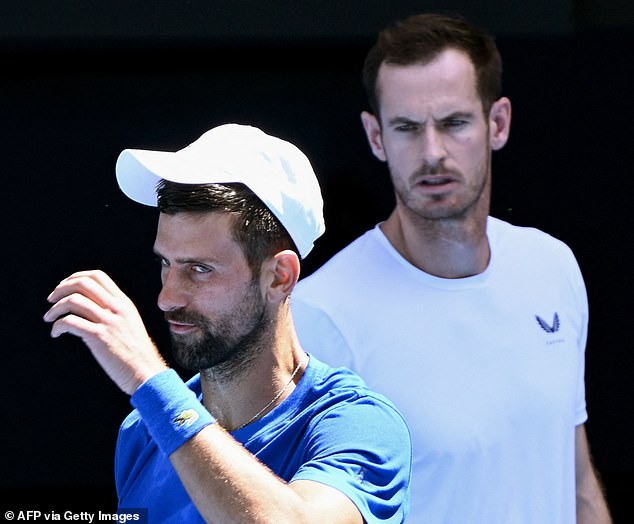
Sir Andy was back in the game after his retirement to coach old rival Djokovic
‘No,’ he said, ‘I was in so much pain I couldn’t sleep at night.’
He had lost sensation in his right leg and it emerged he had a cyst that was pushing on his spinal cord.
Due to have surgery right before Wimbledon, he knew he was going to retire after the Olympics but was worried he wouldn’t make it.
Now, he has no such fears. ‘Honestly, I don’t miss tennis at all,’ he said. ‘And that was something I was really worried about.
‘But I don’t miss hitting a tennis ball. I’m happy just doing stuff with my kids and my family, just doing normal stuff.’
The evening ends with a photo reel of family pictures. In one, it is Halloween and Sir Andy is dressed as a clown. None of the other parents are dressed up. ‘I got properly stitched up with that,’ he said.
His children, he added, stopped their tennis lessons because ‘they just weren’t very good at it’. But, he is sanguine about this, as he is with so much else. Murray just wants them to be happy and, after all the ups and downs of professional life, he seems truly happy himself.
As a theatre audience in Glasgow can testify.












